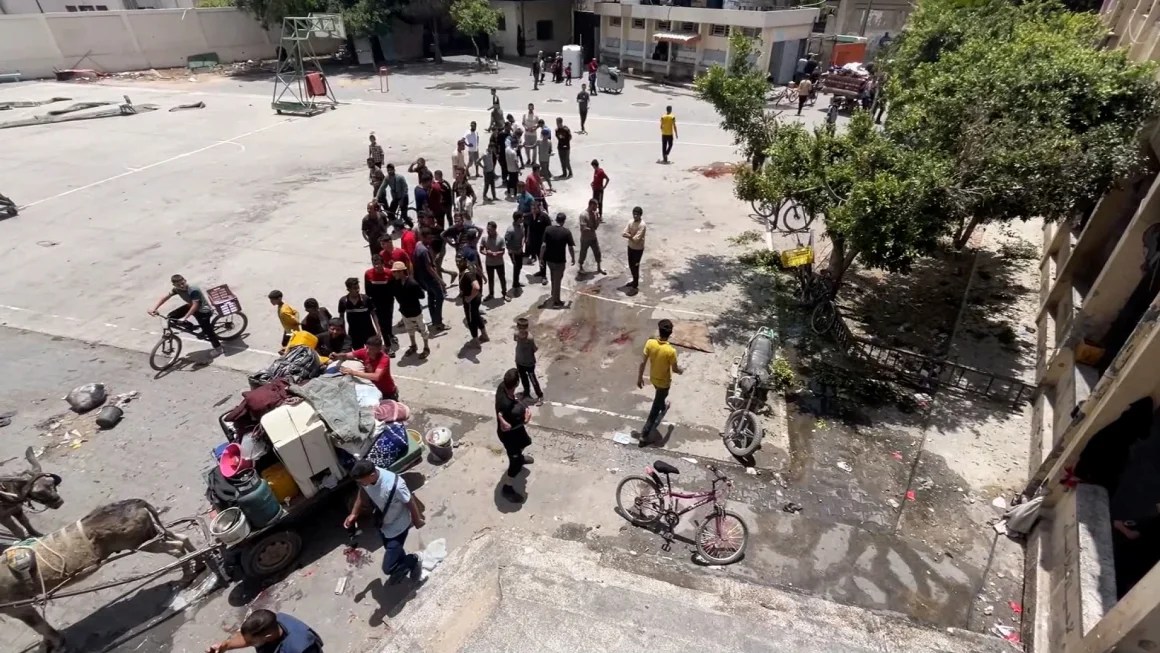The situation in Gaza remains dire as various events unfold amid ongoing conflict. Spain's Defense Minister, Margarita Robles, described the situation in Gaza as a 'true genocide' during an interview with state television TVE. Spain announced its intention, along with Norway and Ireland, to formally recognize a Palestinian state, aiming to end the violence in Gaza. This decision is not against the Israeli state but seeks to address the suffering in the region and promote peace.
In a tragic incident, a drone attack on the Al-Nazla school, used as a shelter in Jabaliya, resulted in the death of at least ten people, including children. Witnesses and local health workers reported that the attack left several injured, highlighting the severe humanitarian crisis. The UN Office for the Coordination of Humanitarian Affairs (OCHA) warned that Gaza's health system is on the brink of collapse due to shortages of fuel, supplies, and medical equipment. With hospitals operating at over four times their capacity and 21 out of 36 hospitals out of service, the situation is critical.
Negotiations for a ceasefire and a hostage exchange deal are set to resume in Cairo, as confirmed by Egyptian and Israeli officials. Previously, discussions had stalled despite some progress during talks in Paris, attended by CIA Director Bill Burns, Mossad Director David Barnea, and Qatari Prime Minister Mohammed bin Abdulrahman bin Jassim Al Thani.
Anti-government protests erupted in multiple cities across Israel, with demonstrators calling for the release of hostages taken on October 7 and demanding general elections. Protesters accused Prime Minister Benjamin Netanyahu of corruption and poor handling of the conflict with Hamas. The Israeli Prime Minister's Office reported that 125 people are currently held hostage in Gaza.
The international response includes efforts by UN humanitarian agencies to address the critical needs in Gaza. The World Health Organization (WHO) and OCHA have called for easing restrictions on aid entering Gaza. Meanwhile, the International Court of Justice ordered Israel to halt its military offensive in Rafah. Despite this ruling, Israeli forces continue their operations, citing ongoing threats from Hamas.
Italy has reinstated funding to the UN Relief and Works Agency for Palestine Refugees (UNRWA), pledging 35 million euros for humanitarian aid. This move follows the suspension of funding by several countries due to concerns over Hamas’s influence within the agency. The resumption of funding is seen as a critical step in addressing the urgent needs of the Palestinian population.
- The Rafah border crossing between Egypt and Gaza remains a pivotal point for humanitarian aid deliveries. Israeli forces claim to have found connections between the personnel at the crossing and Hamas, contributing to the ongoing closure and further complicating aid efforts. Aid organizations have warned about the severe impact on displaced populations in Gaza.
- Efforts to mediate a ceasefire involve key international figures, with France hosting discussions and Egypt playing a significant role in facilitating talks. The involvement of prominent international leaders reflects the urgency and complexity of achieving a lasting resolution to the conflict.
- The humanitarian situation in Gaza continues to deteriorate, with shortages of essential supplies exacerbating the plight of the civilian population. Health officials highlight that some areas are surviving on minimal water supplies, and there is a rising incidence of communicable diseases among children.






